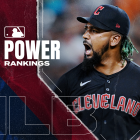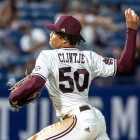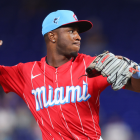The Washington Nationals are facing a pivotal offseason. Despite entering the year as the heavy favorites to win the National League East, the Nationals never clicked, and were outside of the playoff picture for most of the stretch run. Now, the Nationals are in a holding pattern, right alongside 25 other teams, with the difference being Washington's franchise player Bryce Harper set to qualify for free agency in a couple weeks' time. What will the Nationals do this winter?
Well, maybe not as much as fans would like them to do. According to Chelsea Janes of the Washington Post, the Nationals would rather avoid the competitive balance tax (in English: luxury tax) for the upcoming season. Here's more from Janes:
Asked whether the Nationals would put all of the money they saved with the departure of free agents back into the roster next season, Rizzo said only that the Lerner family has always provided him with plenty of resources to build a strong roster. But the consensus internally is not only that the Nationals do not want to eclipse the competitive balance tax threshold for a third straight season, but they do not want to come close.
Janes did the math and -- based on her projections -- found the Nationals could check in with more than $50 million in breathing room between the tax threshold and their CBT figure. (Yes, it's different than the year's actual payroll.) Still, the Nationals have a lot of holes to fill, and doing so could become tricky if they were to drop $30 million annually into Harper or another player.
And yes, retaining Harper remains an option. The Nats "love" Harper, according to Fancred's Jon Heyman, and the Lerner family and Scott Boras have an extensive history -- remember, the two sides came together to keep Stephen Strasburg in town prior to the 2017 season. The Nationals can justify moving on and rolling with Juan Soto and Victor Robles as their building blocks in the outfield if the Harper bidding gets too aggressive, but there's no reason to count them out just yet.
With or without Harper, the Nationals could stand to add at least one catcher, a second baseman, perhaps another starting pitcher, and presumably a reliever or two. (In theory, Mike Rizzo could create additional room by trading someone already on his roster -- say, Adam Eaton or Michael Taylor, depending on what happens with Harper -- but let's try to keep this boat between the buoys.) As such, the Nationals may find themselves in that awkward spot where they could use an upgrade they can no longer afford.
We'll see what Rizzo and the Nationals do this winter. If they disappoint, it'll be a continuation of their regular season.


















